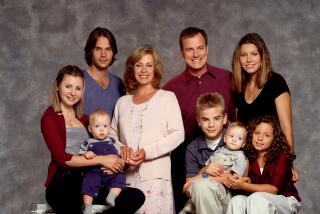‘Big Love’
- Share via
“ Big Love,” HBO’s well-liked polygamous-family comedy, which begins its fourth season Sunday night, breaks down into two shows for me. The first, which is ostensibly the heart of the matter, involves hardware-store mini-mogul Bill Henrickson ( Bill Paxton) and his three wives ( Jeanne Tripplehorn, Chloë Sevigny and Ginnifer Goodwin) and assorted children, and their attempt to reconcile their queer customs with a normal suburban life. The other is an outrageous power-struggle melodrama, surrounding the Mormon splinter sect compound Juniper Creek, where Bill was raised and with which he remains tangentially involved, usually to his displeasure. This “Big Love” I can rather enjoy. The family story I do not believe at all.
That story balances delicately on the portrayal of religious belief, and while such things are usually shown on screen as solidly fixed upon a rock, they are by nature ephemeral and hard to render convincingly -- especially when the people rendering them do not share those beliefs. For all the “Eternal Fathers” and prairie dresses and the attempt to say something meaningful about family, I see nothing here but Hollywood actors pretending.
The Juniper Creek stories, by contrast, are not really about religion at all -- they’re about power, control and bad blood, like “The Sopranos,” with even worse clothes. Notwithstanding the serious issues that surround them -- the exploitation of minors, primarily -- they play as raucous black comedy. Much of Sunday’s opener deals with the farcical disposition of the body of Juniper Creek “prophet” Roman Grant ( Harry Dean Stanton, himself played this season by a waxworks dummy), murdered by Bill’s brother, Joey (Shawn Doyle), in the Season 3 finale. It’s also here that we get the series’ indisputable gift to television, the old-pro turns by Bruce Dern and Grace Zabriskie as Bill’s homicidally feuding parents and the exquisite Mary Kay Place as Roman’s now widow.
And it’s perhaps because Sevigny’s Nicki, as Bill’s wife and Roman’s daughter, belongs to that story as much as to the domestic drama that, of the three wives, she’s the most consistently compelling, a dynamic mass of conflicting, poorly controlled impulses and desires. (Last season she fell in love with a prosecutor and remains so, even as she pushes Bill to become Roman’s successor.) Sevigny is funny and intense, and her scenes with Place, her mother, in tonight’s opener are among its best.
But all of the wives are more interesting than their husband. Paxton’s character remains a problem for me and, as the pole on which this tent depends, a crucial one. Bill is dutifully reliable, even in matters of sex, and a “good provider,” but he is also a bit of a grump, short on charisma, and his vision of bountiful material increase lacks any sense of fun; it’s hard to know what any of these lively women see in him. He is also oddly improvident for a man who wants to fly under the radar -- putting his face on billboards, getting involved in the gaming industry, and this season taking an even more extreme risk of exposure (though in the eventual hope of living openly). Yet this tendency, though it guarantees suspenseful story lines, is never developed into the kind of intriguing character flaw that might lead him and his family into real, permanent trouble.
Notwithstanding their schematically complementary personalities -- because of them, actually -- it can be hard to see what the women see in one another as well. But the show demands that the family be preserved -- it is a comedy, at heart -- and though pushed to the brink again and again, the Henricksons will assuredly sit down to dinner again, in their conjoined backyard, in the warm and unnatural glow of a soundstage exterior.
More to Read
The complete guide to home viewing
Get Screen Gab for everything about the TV shows and streaming movies everyone’s talking about.
You may occasionally receive promotional content from the Los Angeles Times.







